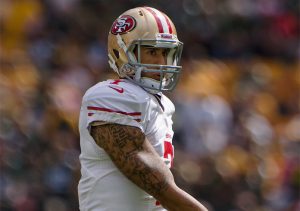Athletes: the only people who can go from “pent house to outhouse in seconds.”
As a former division one athlete, I’ve heard these words a thousand times, particularly from my father. He too was a former collegiate athlete, recruited by the likes of the Oakland Raiders and Dallas Cowboys, and he had become all too familiar with the unique plight of an athlete.
Athletes know it is far too easy to fall from the high graces of fans. One moment people are singing your praises, and the next they’re burning your jersey. Knowing the fragileness of the pedestal upon which many athletes sit, it is genuinely surprising when they risk it all for something they believe in. To take such a risk, they must find that their belief or stance is worthy of the consequences of a loss of fan base and endorsements.
Which brings us to Colin Kaepernick. Kaepernick (and several other NFL players) have decided to silently protest racial injustice in America by kneeling or raising a fist during the playing of the national anthem.
Kaepernick isn’t the first athlete to use his platform and take a form of silent protest on behalf of the voiceless. Kaepernick joins the likes of Muhammad Ali and Olympians Tommie Smith and John Carlos who protested societal ills.
As we consider Kaepernick’s stance, let’s look past the distractions and consider some gospel implications and a way forward.
Looking Past the Distractions
Everyone has an opinion about Kaepernick’s actions. Some people emphasize that he’s paid to play football and should “shut up and play,” or they depict him as unpatriotic and ungrateful of the sacrifices of our service men and women. Others argue that he knows little about the actual black American experience since he is paid millions per year. Still others attack his personal character or performance on the field. Yet each of these reactions ignores the issue that Kaepernick is risking endorsements and fan support to address — racial injustice.
Interestingly, similar character attacks and smoke screens are commonplace when discussing the deaths of unarmed black males in officer involved shootings. The common response has been to focus on the criminal record of the deceased rather than acknowledge the loss of life of someone made in the image of God. Again, though, these responses distract us from dealing with an actual issue in America — racial injustice.
Racial injustice is when people are denied rights and basic liberties because of their race. The particular racial injustice often referred to recently is the lack of justice to black Americans based on race, particularly in the case of officer involved shootings — like those of Terrance Crutcher in Tulsa or Keith Lamont Scott in Charlotte. (For more on this topic, check out my article Black Lives vs. Blue Lives: You Don’t Have to Choose.)
You probably have an opinion on Kaepernick’s method of protest. But my hope is that we would look beyond his method and consider the real issue: How can we resolve the racial injustices in America, rather than allow ourselves to be consumed with the distractions placed before us?
Look beyond Kaepernick’s method and consider the real issue: How can we resolve racial injustice?
Gospel Implications
As believers, we should also consider the gospel implications of his protest. Kaepernick and others have decided to endure criticism and possible loss of fans and endorsements (two players have already lost endorsements) for the sake of others. They have used their voices and platforms to call for change on an issue that has long plagued our country, racial injustice.
As well-paid and well-known athletes, they may not encounter racial injustice as others do. Yet they have chosen to concern themselves with the burdens of those who do encounter such injustice. These athletes speak for those desperate to make their pleas known but have no platform to do so.
As believers we have an even greater, perfect example of One who takes on the burdens of those who could never repay Him, who intercedes for the voiceless and gave His life as a ransom for many. Jesus truly bore our burdens upon His shoulders.
Considering our greater example, my prayer is that we would consider our Savior and look for ways we too can carry one another’s burdens — even if that comes as a sacrifice for us. May we reflect on how we can best glorify God and love others in the midst of a broken world filled with hurting people looking for answers. When the world seeks these answers, may they be able to find them in the church, hear them through the lips of His people and see them in the way we engage these issues.
Maybe you don’t agree with Kaepernick’s form of protest. Either way, let’s pray that we would reflect Christ in our responses to his behavior. More importantly, let’s pursue reconciliation and solutions to racial inequality, and speak where the church has often been silent.
Image of Colin Kaepernick: Mike Morbeck / Wikimedia Commons




Comments and Pingbacks
2018-03-16 06:30:52
5 Ways to Build Bridges in a Postmodern Culture | Intersect
[…] Facebook feed was filled with opposing views about football players taking a knee in protest during the national anthem following President Trumpâs remarks on the matter last […]
2018-11-30 21:30:32
Why the Church Needs Black Girl Magic | Intersect
[…] of otherness has only increased in recent years. After events like the murder of Trayvon Martin and Colin Kaepernickâs protests, some sort of chasm seemed to have opened between me and my white brothers and sisters in Christ. […]